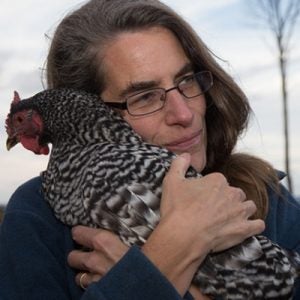Lessons Learned from Raising Chickens and Growing Organic

Mistakes Made & Lessons Learned From Raising Chickens and Growing Organic Vegetables at Our Off-Grid Home
Guest Post by Tory McCagg
On the Beginning Farmers’ website, there’s a quiz you can take to see if you’re destined to be a farmer. I rated in the “farming might not be a good career choice for you” category. And yet, here I am, at our off-grid home in New Hampshire, Darwin’s View, where we raise chickens and tend to our organic garden. The good news is, I have Carl. He rockets me up into the “you just might survive this experience” category. (I just made that one up.)
Arguably, my first mistake was ordering our first 6 chicks years ago, given that it is by following their scattered and dithery lead that my husband, Carl, and I have moved permanently from the city to the country, away from my familiars and to a life that’s about pushing a wheelbarrow, not a pen.
Those 6 chicks have made way for 38 others over the course of the past 8 years. Currently, we have 17, and I spend my days sallying forth with a trowel in one hand, and in the other, packets of seeds for my fall garden, seeds that were supposed to be in the ground weeks ago but hey, due to climate change, maybe the season will be longer and give those microscopic seeds a chance to grow.
What are the lessons learned from raising chickens and growing organic food for us?
There is little we truly control
This summer, I successfully seeded and planted out healthy seedlings. The next morning this proud gardener went out to check on those lush, green dears to find them gone, eaten to the nub by a raccoon and a porcupine.
For once, we planted our potatoes early, only to learn from other farmers that the key is to plant potatoes late, so that when the potato bugs hatch early, there are no potato leaves to decimate. The potato bugs had a roman orgy, leaving the dregs to the voles, who are tucking in as I type.
Back to the chickens, who are rumored to eat bugs? They pecked at a potato bug or two but then focused their attention on our nice, plump tomatoes. When I call to them, they look up, tomato juice clinging to their beaks.
When humans plan, nature laughs
Chickens are a joy and a heartache, and, thus, they epitomize farming: the joining of great hopes and nature’s realities. They have taught me to trust nature’s sense of humor – what we thought was a hen turned out to be a rooster – and, thus, to expect the unexpected: 76 eggs hidden underneath the poop board.
They’ve also taught me to be prepared to succeed where I didn’t think I would, to fail where I assumed success and to celebrate with gusto the beauty of a perfect egg, and the opportunities and responsibilities that come with having a piece of land one might heal.
Soil is a life force and precious, threatened resource
Soil is alive. It is dynamic, life-giving, and invigorated by (a limited amount of) the hens’ scratching and pecking, and manure. Digging in soil, as any chicken will tell you, is a rejuvenating act. In turn, we can rejuvenate the soil. Regenerative agriculture practices sequester carbon, stop soil erosion and improve soil health, and increase wildlife habitat.
So is farmland
Farmland is being lost every day as retiring farmers sell their land—their life’s investment—to NOLOs (non-farming land owners) and investors, not because they want to but because the land is their retirement fund, and beginning, established and transitioning farmers cannot afford to pay developers’ prices. And yet, if all our farmlands become lawns or pavement, where and how will we grow our food? Carl and I support, and have been supported by, organizations like American Farmland Trust and Land for Good. These organizations and others work to save our farms, support our farmers, and assist in getting new farmers on to farmland.
About Tory McCagg
Award-winning writer Tory McCagg is the author of At Crossroads With Chickens: A “What If It Works? Adventure in Off-Grid Living And Quest For Home. She lives with her trombonist husband, one cat and myriad chickens at Darwin’s View in Jaffrey, New Hampshire where they all practice an experimental life off-grid and on the land.









 Your Privacy Choices
Your Privacy Choices
Leave a comment